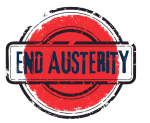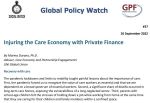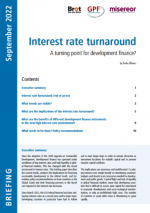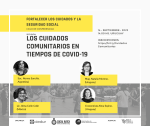Social Watch News
Published on Thu, 2022-11-03 18:40
This GPW Round Up #3, CSO Participation at the UN: Perspectives on CSO Engagement in UN Processes, highlights some insights, analyses, commentary and advocacy regarding civil society organizations engaging in UN multilateral processses. From the Member States to the UN Secretary-General, CSOs are frequently exalted as an integral part of multilateral policy-making processes; yet, whether their calls and analyses are genuinely heeded is up for debate. Some Member States and CSOs have called for improvements in CSO participation, supported by recommendations from experts on reforms to CSO engagement.
|
Published on Tue, 2022-11-01 11:22
In September 2022, heads of state and government spoke at the UN Headquarters on the theme “A watershed moment: transformative solutions to interlocking challenges”.
Secretary-General António Guterres’s message was clear: “Our world is in peril and paralyzed". He launched the High-level General Debate bluntly: “Our world is in big trouble. Divides are growing deeper. Inequalities are growing wider. Challenges are spreading farther.” He urged, “We need action across the board.”
|
Published on Thu, 2022-09-29 00:00
The video of the session The event End Austerity Now! is now available.
85% of the world’s population is expected to be under some sort of austerity measures in 2023, according to analysis of IMF projections. But austerity cuts are not inevitable and alternatives exist. In this event, some of the world’s leading experts provided short, powerful and inspiring statements on why we need to end austerity now.
|
Published on Mon, 2022-09-26 15:38
Recovery with care
The pandemic lockdowns and limits to mobility taught painful lessons about the importance of care. First, the pandemic forced us to recognize the value of care workers as essential and that we are dependent on a broad spectrum of essential workers. Second, a significant share of deaths occurred in long-term care homes, exposing the vulnerabilities of a long-neglected sector. Third, parents with school-age children felt the stresses of holding down a job while working from home at the same time that they are caring for their children and family members within a confined space.
|
Published on Fri, 2022-09-16 17:55
Crucial to the achievement of the Sustainable Development Goals (SDGs) of the 2030 Agenda is SDG 17, “Strengthen the means of implementation and revitalize the Global Partnership for Sustainable Development”. Increasingly, discussions now take the form of multistakeholder partnerships and engagement with the business sector as a tool to mobilize finance for the SDGs or generate needed capacity - often to develop a pipeline of bankable projects. This partnership orientation has become a regular feature of the UN agenda, from the Economic and Social Council (ECOSOC) Operational Activities Segment in May 2022 to the High-Level Political Forum (HLPF) in July 2022.
|
Published on Thu, 2022-09-15 19:54
Since the adoption of the 2030 Agenda on Sustainable Development, development finance has operated under conditions of low interest rates and high liquidity in global financial markets. This has changed with the recent turnaround in interest rates. The briefing paper Interest rate turnaround. A turning point for development finance? by Bodo Ellmers, describes the current trends, analyzes the implications for financing sustainable development in the Global South, and formulates policy recommendations on how countries in the Global South and their financing partners in the North can respond to the interest rate increases.
|
Published on Wed, 2022-09-14 00:00
CONTRIBUTIONS TO THE DISCUSSION ON SOCIAL PROTECTION IN SOUTH AMERICA
The second videoconference will be “Los cuidados comunitarios en tiempos de COVID-19” on Wednesday, September 14, 2022 at 2:00 p.m. of Argentina / Brazil / Uruguay, confirm your local time here.
Speakers: Soc. Norma Sanchís (Argentina), Mag. Natalia Moreno (Colombia) y Lic. Alma Colin Colin (México). Moderation will be in charge of Alma Espino (Uruguay).
|
Published on Thu, 2022-09-08 15:23
Since the 2012 United Nations Conference on Sustainable Development (Rio+20), the United Nations has annually convened the High-level Political Forum (HLPF) under the auspices of the UN Economic and Social Council annually and at Summit level under the auspices of the General Assembly every four years. The HLPF is the main mechanism through which UN Member States assess global progress on meeting the Sustainable Development Goals (SDGs) set by the 2030 Agenda for Sustainable Development. Member States can present their country reports on achieving the Sustainable Development Goals through Voluntary National Reviews (VNRs). The main SDGs for review at the 2022 HLPF were SDG 4 on quality education, SDG 5 on gender equality, SDG 14 on life below water, SDG 15 on life on land, and SDG 17 on global partnerships, with an overall theme on how the COVID-19 pandemic has impacted development progress.
|
Published on Thu, 2022-09-08 00:00
With the aim of strengthening the political incidence of civil society in favor of social protection in South America, it is proposed a cycle of conferences with the participation of various organizations of civil society (e.g. feminists, trade unions, ecumenical, etc.) and experts in the field. Within the framework of the general issues of social security, with new proposals, such as minimum social protection, and from a consistent perspective of ensuring the sustainability of life, it is arises an innovative approach. For that it is necessary an official care policy which contemplate supports and complements care work and defends the recognition of the "right to care", gender equality and human development. Likewise, ways of financing social protection are explored, including the creation of a global fund.
The first videoconference will be “Social protection from care” on Wednesday, September 7, 2022 at 2:00 p.m. of Argentina / Brazil / Uruguay, confirm your local time here.
|
Published on Sun, 2022-09-04 17:46
Concept Note and Program
Download pdf version.
The COVID 19 pandemic revealed the vulnerabilities of our societies in health terms, such as the lack of protection mechanisms so that the population could face the economic and social crisis that the pandemic brought about.
In 2020, 53.1% of the world population didn’t have any type of social protection coverage. Specifically in the Americas, coverage exceeded the world average, reaching 64.3%. However, this figure varies according to the type of social protection considered. For example, in the Americas, only 16.4% of unemployed people had at least one benefit (ILO, 2022).
|
SUSCRIBE TO OUR NEWSLETTER
Submit

|









